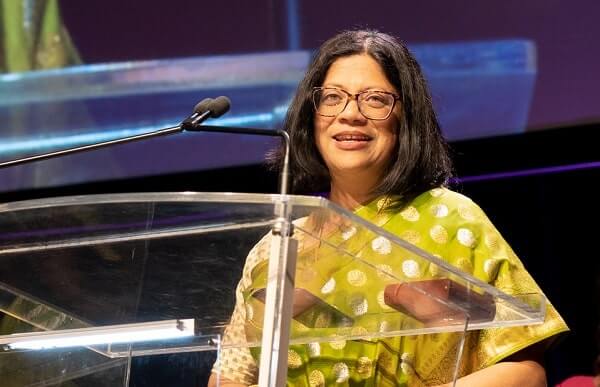Veena Nair thought it was a scam call when the Minister for Industry and Science Ed Husic rang her recently.
“Ultimately when I did call him back, I did so thinking he was following up on something I wrote on LinkedIn, where I’m very active,” she laughed.
When he told her she was in this year’s Prime Minister’s Prizes for Science, all she could muster was, “Are you sure?”
Veena Nair, Head of Technology at Melbourne’s Viewbank College, has won the Prime Minister’s Prize for Excellence in Science Teaching in Secondary Schools.
As a physics graduate who qualified in electronics, Veena has been teaching science subjects for more than 20 years in India, UAE and Australia.
“Currently I teach VCE Systems Engineering to Years 11 and 12, and also prepare students who may be interested in this subject from Year 9 onwards,” Veena told Indian Link.
Systems Engineering is a subject option that prepares students for careers in engineering, manufacturing and design. It integrates aspects of designing, planning, producing, testing and evaluating in a project management process.
Teaching science at the secondary level in Australia must be challenging, we put to her, given the outlook for science literacy has been described as ‘bleak’.
“Yes I have encountered the perception that science is difficult,” Veena observed. “I tackle this in many different ways. For starters, I’m constantly giving the students opportunities to experience science and engineering first-hand. I love to expose them to what engineering looks like – that it’s not hard, that it can be interesting, and that they can do it.”
She does this particularly well – her students tell her she should have been in sales and marketing.
The gender divide is another issue that bothers Veena. “My classes are currently 70-30 in favour of males; my goal is to raise it to 50-50. I work to get the fear out of the female students. Give it a shot, I tell them.”
3D printing, an essential aspect of her early course, has been a great way of initiating the girls into science. “Every industry uses it, I tell them; try it, it’s a skill you can use whatever workplace you find yourself in. I make science less threatening, and more enjoyable.”
She counts as a career highlight a shy and retiring Year 9 student, who was so science-phobic she wouldn’t work on a laptop. “She blossomed as she continued in my classes through to Year 12, finished as one of the top students in the state, and took engineering at university.”
Another program Veena is enthusiastic about in her work is Superstars of STEM, a nationwide platform in which select science personalities trained as ‘ambassadors’ regularly present to the media, on stage and in schools. “Representation matters, and we have some wonderful role models from our own community – Madhu Bhaskaran, Onisha Patel, Veena Sahajwalla. They are great inspirers towards science, for our girls especially.”
The program also helps build scientific temperament. “An epidemiologist presentation I organised during lockdown for example turned out wonderfully; parents joined in too as the expert provided evidence-based information and knowledge about COVID and vaccination. We need more such conversations.”
Equally, Veena Nair believes, teachers must proactively encourage the take up of science in other ways. “We’ve got to connect with new technology. As teachers we must move away from old methods of teaching and incorporate new advancements. Students are already tech savvy, and if you don’t provide the new platforms, they won’t engage. Bridge that gap between curriculum and pedagogy.”
Is there a realisation at the school level that we need more scientists in this country?
“There is in my school, and I push it a lot. I’m passionate about greater engagement from industry and tertiary education. In 2017 I wrote to universities to provide extra ATAR points for Systems Engineering students – I was able to pull it off. In recognition of this I was given the Educator of the Year Award in 2018 presented by the Design and Technology Teachers’ Association of Australia.”
Today 90% of Systems Engineering students go on to engineering at university.
Veena also makes the most of other available programs to bring science closer to her students. One such is the Young Persons’ Plan for the Planet (YPPP), an extra-curricular and interdisciplinary activity at school based on the UN’s Sustainable Development Goals, to deliver local, regional and globally sustainable outcomes. “Australian and Indian students collaborated successfully on a YPPP project recently,” Veena related.
“Again, in the Swinburne Youth Space Challenge, students get the opportunity to work with space scientists in a 10-week program, competing to develop an experiment to launch into space. The winning project is sent to the International Space Station with the help of industry partners.”
At STEAM Club, where the A stands for Art, Veena leads integrated art and technology projects like wearables.
These innovative initiatives aside, Veena Nair’s infectious enthusiasm for all things science must be rubbing off on her wards at school – it certainly makes us want to go back to school science.
READ ALSO: Dr Darshi Ramanathan in the NSW Premier’s Science Awards 2022




